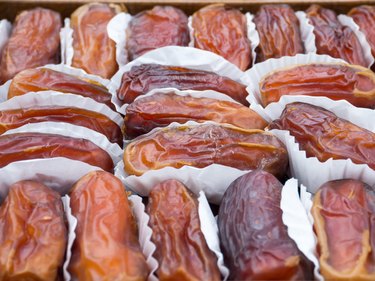
Diverticulitis occurs when diverticula -- small bulging sacs or pouches that form in weak spots of the lining of the intestine -- become infected or inflamed. Though these diverticula can form anywhere in the digestive system, they're usually found in the large intestine and colon. Diverticulitis is treatable and rarely requires hospitalization. Because some foods inflame and irritate the digestive tract, they must be avoided or consumed in moderation when you experience symptoms of diverticulitis.
Causes and Incidence
Video of the Day
The cause of diverticulitis is unknown, but a low-fiber diet is likely one of the contributing factors. The lack of fiber often results in constipation or hard stools, which increases pressure on the colon during a bowel movement, possibly causing the sacs to form. While the presence of diverticula is common in those over age 40, more than half of Americans over the age of 60 are diagnosed with diverticulitis.
Video of the Day
Symptoms and Treatment
If you have diverticula, you probably won't exhibit any symptoms. However, once they are inflamed and diverticulitis occurs, you may experience bloating, abdominal tenderness and pain, nausea and vomiting, decreased appetite, change in bowel movements and sometimes bloody stools. Typical treatment includes bed rest, pain medications and antibiotics. Surgery is performed in rare cases.
Diet Modifications
If you've been diagnosed with diverticulitis, your doctor will first instruct you to follow a liquid-only diet to help empty out your colon and for the infection to heal. Once your symptoms have diminished, which takes several days, begin to slowly consume whole foods again. This should be done gradually, limiting the amount of fiber-rich foods you eat at first, such as fruits, vegetables and whole grains.
Foods to Avoid
Once the condition is treated, it is possible to experience diverticulitis again. Once diverticula form, they remain in your intestine forever. While an increase in fiber and liquid intake is recommended to avoid future inflammation, dietary modifications are necessary when you're experiencing symptoms of diverticulitis.
Do not consume course grains, dried fruits, beans, peas, skins from fruits or vegetables, pickles, cucumbers, strawberries, corn and coconut. Consult your doctor before consuming nuts or seeds, and try to avoid excessive consumption of beverages that make constipation worse, such as alcohol, coffee and tea.
Other Considerations
Because every patient is different, talk to your doctor before eliminating any food group and to help pinpoint what foods trigger the inflammation. Also increase your exercise and aim to consume more fiber in your diet.